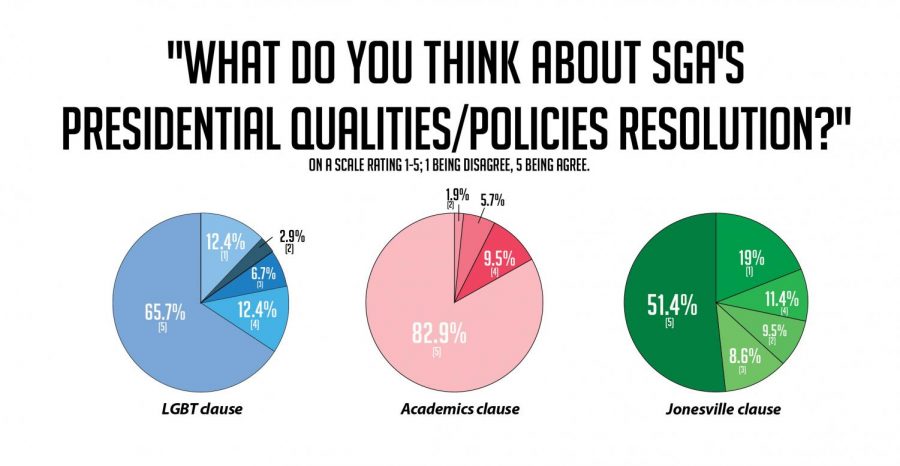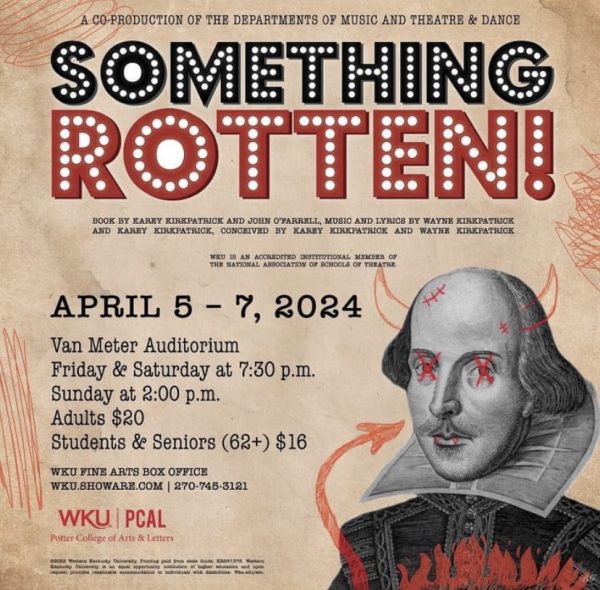Majority of respondents favor proposed resolution
March 29, 2016
Several Student Government Association senators have co-authored a resolution of qualities they believe the next university president should embody. The resolution will be voted on in the April 5 meeting.
The resolution is a collaborative effort between the eight co-authors in a process to involve as many voices as possible in deciding what the qualities of the next president should be, according to SGA senator and Bowling Green senior Kate McElroy.
“Since this is something that affects students greatly, we wanted to have student voices represented,” McElroy said.
McElroy said John Winstead, SGA senator and Herald columnist, reached out to her to be a co-author. She said Winstead has done a lot of the writing and compiled research for the resolution. But, she said just about every clause was done in conjunction with people and organizations outside of SGA such as the Office of Sustainability.
“We really tried to make this a collaborative thing,” McElroy said.
The Herald reached out to students online via a Google Forms survey to gauge the level of agreement respondents had with each of the clauses currently within the resolution. At the time of publication, the clauses included in the survey are still within the resolution and have not been altered nor have none been recently added. The full list of responses will be published online.
The survey gauged responses on a scale from one to five. One representing full disagreement with the clause, and five representing full agreement with the clause. The number of survey respondents amounted to 105.
Apart from the clause of maintaining the university’s current policy of allowing student-run media, such as the Herald, to operate free of university oversight, the clause which received the most ratings of five was the prioritization of academics, with 82.9 percent of respondents rating the clause as a five.
This high rating did not come as a surprise to McElroy. She said a university should serve as primarily a place for academic pursuits but she also understands it functions as a place for athletics and extracurricular activities as well. She also recognized the clause as one of the least contentious because students are here to learn and get a degree.
“I think that its primary goal is, and should be, to educate future generations,” McElroy said.
Other clauses included “providing and maintaining resource centers for marginalized student communities” such as racial minorities and students with disabilities. This clause was voted by 65.7 percent of respondents as a five and 12.4 percent of respondents as both a one and four.
The clause which received the most ratings of one and two was the clause to “acknowledge WKU’s unfair historical treatment towards the Jonesville community.” The clause currently stipulates that solutions for how reparations can be made and the acknowledgement of “expanding into lower income neighborhoods with university building projects.”
Jonesville was a predominately black community and was made up of approximately 70 families in the community in 1950, according to the University of Kentucky Libraries “Notable Kentucky African Americans Database.”
“In 1964 the Urban Renewal Commission condemned the Jonesville properties, then took over the properties and sold the land to WKU at a cheaper price than would have been paid to the property owners,” the database states.
The Jonesville clause received a 51.4 percent five rating, but a 19 percent one rating and a 9.5 percent two rating.
McElroy said this clause was included to highlight the importance of placing institutions in the context of how they were created and how they were enabled to flourish.
“I think conversations about gentrification, which is what happened with Jonesville, are very important to have and I feel like they can be learning experiences,” McElroy said.
She emphasized that the clause is not meant to demonize the administration or other individuals, but to serve as a reminder of where WKU has come from.
McElroy said she has hopes the resolution will pass.
“SGA is an organization that wants to support and really get the best option for the student body, so I hope it would pass,” McElroy said.














![Students cheer for Senator at Large Jaden Marshall after being announced as the Intercultural Student Engagement Center Senator for the 24th Senate on Wednesday, April 17 in the Senate Chamber in DSU. Ive done everything in my power, Ive said it 100 times, to be for the students, Marshall said. So, not only to win, but to hear that reaction for me by the other students is just something that shows people actually care about me [and] really support me.](https://wkuherald.com/wp-content/uploads/2024/04/jadenmarshall-1200x844.jpg)




![Megan Inman of Tennessee cries after embracing Drag performer and transgender advocate Jasmine St. James at the 9th Annual WKU Housing and Residence Life Drag Show at Knicely Conference Center on April 4, 2024. “[The community] was so warm and welcoming when I came out, if it wasn’t for the queens I wouldn’t be here,” Inman said.](https://wkuherald.com/wp-content/uploads/2024/04/smith_von_drag_3-600x419.jpg)






